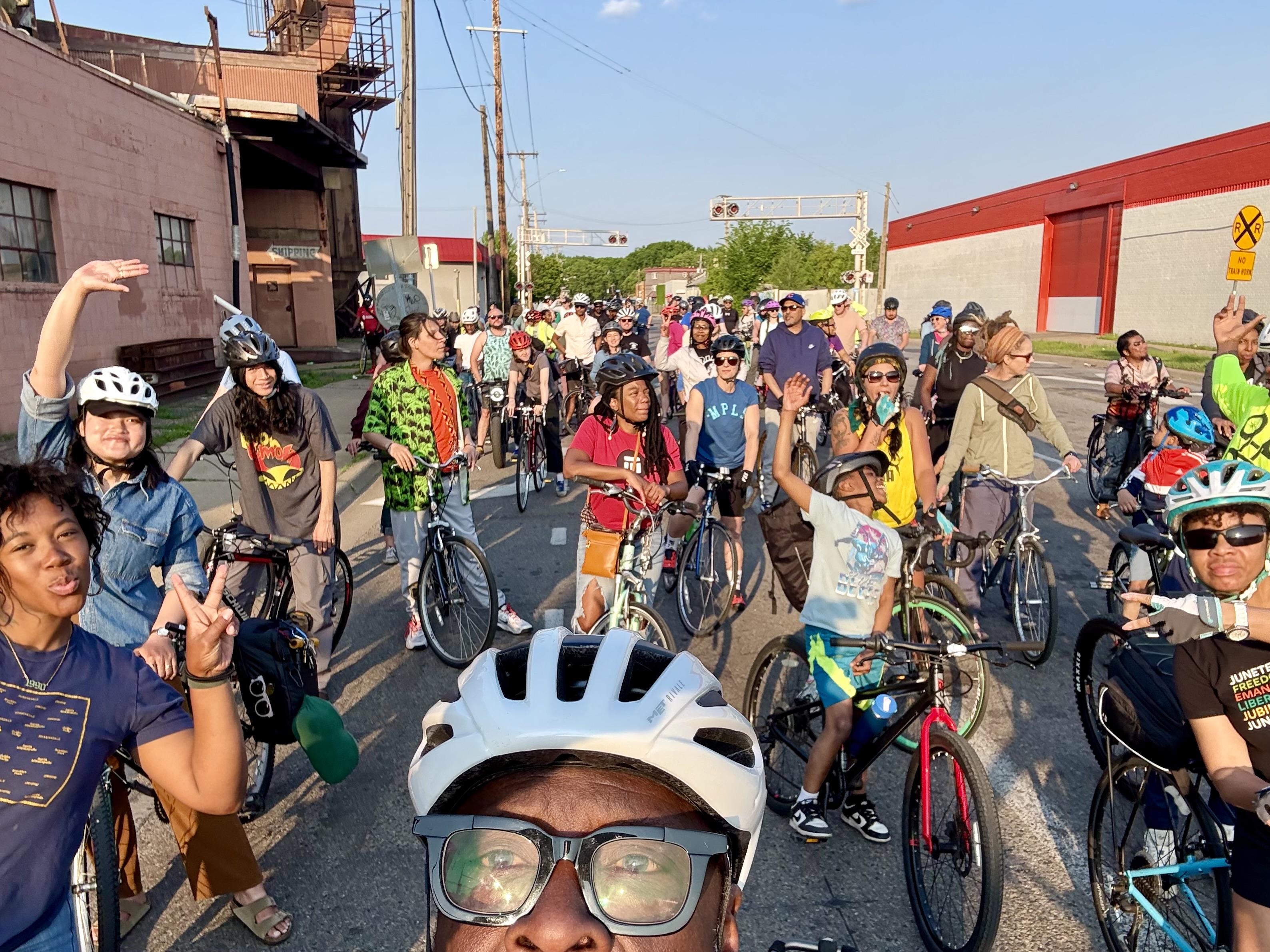About 85 cyclists slow-rolled in tandem through South Minneapolis on Sunday, the fifth anniversary of George Floyd’s murder at the hands of four city police officers. The group visited four sites central to the 2020 uprising, stopping briefly at each to reflect and listen to portions of nearly 20 firsthand audio narratives of the unrest.
Those narratives were compiled by VOICES: Minneapolis, May 2020, a collective supported by Lake Street Lift and funded in part by the Minnesota Department of Employment and Economic Development and the Minneapolis Arts & Cultural Affairs department.
Just days after Floyd’s murder, VOICES collaborators set up a temporary recording studio at Midtown Global Market (MGM) to record interviews with organizers from across the Ninth Ward, members of the resident defense group based at MGM and business owners from MGM and the wider Lake Street corridor. They then organized the minimally edited recordings by audio tour location: George Floyd Square, Powderhorn Park, the Third Precinct and MGM, each of which has a QR code for visitors to scan and listen.
“We felt it would be more impactful to think about this location by location because so many things happened [during the unrest] that affected place,” says VOICES founder Carla Godwin, who also serves as executive director for the PERIS Foundation and project manager for the Graves Foundation.
Other VOICES collaborators include Anthony Taylor, co-founder of Melanin in Motion and Venture Bikes; Beth Gibbs, a local podcast producer and editor; Andy Graydon, an artist and filmmaker originally from Hawai’i; and Gary Lo and Kris Growcott, who handled creative strategy, design and copywriting for the project.
Godwin convened VOICES to address the widening disconnect she and other Midtown residents saw between local, national and international media coverage and events on the ground. Most media coverage focused on sensational images and video — clashes between activists and law enforcement, fires, acts of vandalism — without interrogating the real impact of Floyd’s murder and subsequent unrest, VOICES says. That simplified, sanitized accounting created space for revisionist narratives to flourish as firsthand memories fade.
VOICES’s work challenges those bad-faith attempts at rewriting history.
In their temporary studio at the height of the COVID-19 pandemic, the collaborators asked interviewees to reflect on how the unrest impacted their lives, businesses and the broader community. The responses are raw and at times difficult to hear, particularly for listeners who experienced the unrest themselves.
“Some of the clips were hard for people to hear,” Godwin said, recalling the May 25 ride. “They are also impactful for people to hear.”

The interviews contain no narration and minimal production effects. The longer 10- to 20-minute interviews on VOICES’s website are edited for length and to remove interactions with the interviewers. The QR-accessible audio tour clips are shorter still, making them easier to share and creating a more accessible experience for passers-by. Static added in post-production indicates removed portions.
VOICES has already created a durable, interactive record of the decade-defining events of May 2020. Godwin and her collaborators hope for more. They shared copies of the raw, 60- to 90-minute interviews with the Minnesota Historical Society for archiving and hope to see them preserved for a wider audience at some point in the future, Godwin says.

For now, VOICES and Melanin in Motion are putting on two more Slow Roll rides — incorporating the four audio tour stops — on June 5 and June 19. Riders can meet up at Venture Bikes on the Midtown Greenway (2837 10th Ave. S.) starting at 5 p.m. both days; roll-out is at 6 p.m.
And if you can’t make one of the organized rides, the QR codes will be out until further notice, Godwin says.

.jpg)





